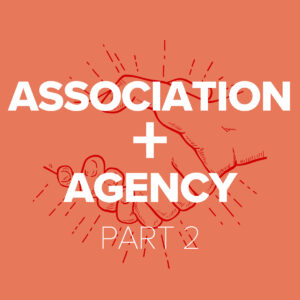
You may have just read the first blog in this series, How to Hire an Agency: Insights from 17 Years of Agency Services for Associations. Now we’re ready to dive into the details of the best practices in hiring an agency to work with.
We know this is a huge decision, and it isn’t one you should take lightly. After 17 years, I’ve seen it all. And I’ve got seven actionable tips you can use to get started on your client/agency matchmaking journey.
Do Your Homework
If you Google “marketing agency for associations,” you’re going to get pages and pages of results. Some might be close to what you’re looking for, but most will totally miss the mark. That’s why it pays to start with research. Take some time to explore your options, and consider taking these steps:
- Read reviews: Any trustworthy agency is going to have plenty of social proof (things like ratings, social media engagement, certifications, memberships, etc.) that shows they know their stuff.
- Ask around: Visit online forums like ASAE’s Collaboration Forum, Quora or Reddit, and ask for others to share their experiences looking for agency partners. Depending on your area, you may even find tips and insights on local agencies.
- Turn to other associations: It’s likely you have a lot of contacts in your industry. It’s time to start hitting them up for details on the agencies they’ve used, ones they’ve loved, and ones they’d warn against.
- Pay attention: See a marketing campaign you love? A commercial you can’t get out of your head? An email campaign that got you to click? When you notice great marketing in action, try to track down the source. Make it a habit to check your local agency websites and browse portfolios. Or, if you know a marketing manager from an organization whose marketing you admire, reach out and get the details.
Know Your Goals
What do you hope to achieve with your future agency? Are you looking for a one-and-done campaign, or a long-term relationship that lasts? Do you want to increase membership, expand programming, or launch a new platform? Whatever you want to accomplish, be sure to document it, so your new agency will start off on the same page. And, as with any goal, make sure it’s SMART – Specific, Measurable, Achievable, Relevant and Time-Based.
Set Your Marketing or Campaign Budget
You may think you can’t afford to hire a marketing agency, but in reality, you may not be able to afford not to. As I mentioned in the first blog of the series, outsourcing to an agency saves you plenty of dollars in overhead, hiring and expenses. But you’ve only got the money you’ve got, so you need to spend it wisely. There’s no hard and fast rule as to how much of your marketing budget you should allocate to agency spend, but it helps to know the various pricing models you may come across.
- Retainer: This is a pretty common model, in which you pay a monthly fee to access an agreed-upon amount of services and time. A retainer offers great flexibility and helps you build a lasting partnership, but it is a longer commitment and an ongoing expense. This is our preferred way of partnering with clients, as it allows us to really get ingrained in your organization, connect dots, and participate at a strategic level.
- Project-based: If you know you only need help for a specific campaign, you may consider a project-based model, in which you outline a scope of work for the project and set deliverables. You may pay before work commences or once it’s completed, depending on your agreement with the agency.
No matter your preference, make sure that you and the agency you choose are on the same page when it comes to pricing, billing and payment, to avoid any future conflict or misunderstanding.
Start Vetting Agency Candidates
Once you’ve got a shortlist of top agency contenders, you’ll want to start the vetting process. Here are some considerations to keep in mind:
- Who have they worked with in the past? Check out their roster of previous clients, and look for those in a similar industry or niche to you. Don’t be afraid to ask them to connect you with a former or current client for an honest and unbiased opinion.
- Are they experts in associations? Associations have very specific needs, and an agency with expertise exclusively in B2C or ecommerce isn’t going to have the knowledge you’re looking for.
- Can they provide proof of performance? Any agency worth its salt is going to have case studies they can offer you, so you can see how they’ve worked with other organizations, and the results they were able to achieve.
- Are you limiting yourself? If you get too niche when looking for an agency, you may eliminate teams in adjacent or complementary industries that can bring fresh insights to the table. Get specific with your wants and needs, but keep an open mind.
Nail Down the Process
Every agency has its own unique work process. Some will be compatible with the way you do work, and some won’t. It’s important to figure out compatibility right from the start. Here’s how:
Clarify Expectations
You want an agency that delivers the goods, but if you haven’t outlined what those are clearly and succinctly, there are going to be some issues. Before signing anything, lay out the terms of your relationship, including what deliverables you want to see, what the timeline is, and what the process looks like for approvals and revisions.
Outline a Communication Plan
Communication is the most crucial key to building a successful relationship with your agency. But it’s also one of the hardest to get right. Look for an agency that assigns you a point of contact right from the beginning, and make sure they’ve got a communication plan clearly outlined, so you always know who to go to in any given scenario. Also determine a response timeline, so both sides know when they can expect to get answers to questions and requests.
Schedule Check-Ins
Some agencies will take your information, your goals (and your $$$) and you won’t hear from them again until they deliver a product. That may work in certain scenarios, but most of the time, you’ll want to plan for regular meetings and check-ins — especially if you have a retainer agreement. You may want to consider regular status meetings (monthly or weekly, depending on needs), kickoff/strategy meetings for new campaigns, and analytics meetings to go over results.
Analyze Results
Speaking of analytics, you want to make sure the agency you choose is providing you with solid data and using that as a way to align strategy and creative. Keeping an eye on the numbers also helps you see your progress, and lets you know that you’re on the right track. If the growth you’re seeing isn’t what you hoped, don’t hesitate to ask for an update, and detailed info on how they plan to get you the results you outlined in your goals and expectations.
Consider Investing in Research
Being data-driven isn’t just about increasing numbers. It can also be about digging into those numbers to gain meaningful insights through primary research. Finding an agency that has the capability to conduct statistically significant and accurate research can be majorly impactful to your association, and your industry as a whole. Research collects and compiles information so you can interpret it in new ways. It’s also a great way to engage and connect with your membership, and let them know how much you value their opinions.
Communicate, Communicate, Communicate
We can’t say it enough — your relationship with your future agency hinges on communication, and there’s honestly no such thing as oversharing. Want to get off on the right foot? Here’s what you do:
Practice brutal honesty. Yes, it can be awkward. But it can also save a campaign, and sustain your relationship with the agency. Bring it all to the table, and let your agency know you expect them to do the same. As an agency with a core value of “Open”, we value and admire partners who can have open and honest dialogue with us.
Tell them what you want. And what you need. Make sure they know exactly what is going to make you happy. What will get you to tell your network that this agency is the real deal? What will compel you to refer your peers and colleagues? Make a list, and hold them to it.’
Tell them what you don’t want. What are the make-or-breaks for this relationship? Just like you, they’re running a business, so they deserve to know exactly what will lose them your business.
Know that every detail matters. No matter how small or seemingly insignificant, the more you share, the more knowledge they’ll have, and the better able they’ll be to connect the dots and deliver a successful campaign.
You Don’t Need an Agency. You Need a Partner.
Your agency should be an extension of your internal marketing team. They should share your goals, and know that your success is their success. This is especially important for associations, who aren’t always looking for more revenue or sales. Instead, they want to retain and increase their membership, fulfill their mission, engage their members and do something meaningful. And to make that happen, it takes trust, communication, and hard work — just like any healthy relationship.
Still wondering how to find the agency that’s the perfect match for you? I’d love to chat! Reach out with any of your questions.
